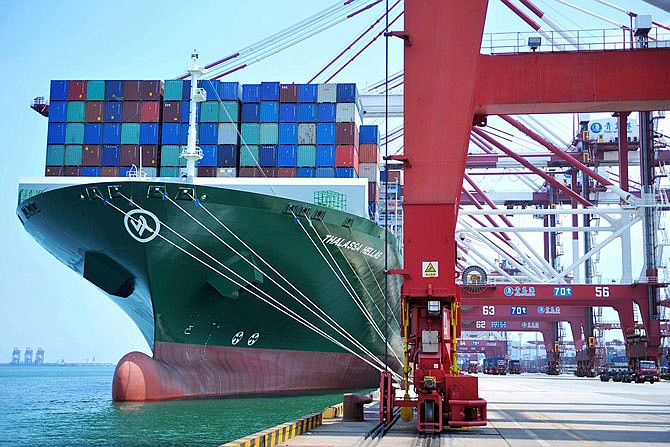Industry, agriculture and political leaders condemned Trump administration policies that placed $34 billion in tariffs on Chinese products Friday morning.
The previously announced tariffs went into effect at 12:01 a.m. EDT Friday morning. China immediately followed through with similarly sized tariffs on U.S. goods. Already, U.S. manufacturers and farmers found themselves fending off tariffs from large U.S. trading partners like Canada and Mexico as trade wars across the globe escalate.
Dan Mehan, Missouri Chamber of Commerce and Industry president, said $881 million in Missouri exports are being threatened by the trade moves made so far.
"The daily headlines about the Trump administration's aggressive trade moves - and the ensuing international retaliation - are cause for serious alarm in Missouri," Mehan said in a news release.
Many of the tariffs imposed by the Trump administration have been designed to protect steel and aluminum manufacturers in Rust Belt states. As the ripples from retaliatory tariffs hit manufacturers and farmers across those same states, industry leaders like Mehan feel these industries are being cannibalized.
"It's not wise for the government to use tariffs in a way that leads to a boon for one industry while creating inefficiencies for others," Mehan said. "They drive up prices, take money out of consumers' wallets and slow our economic growth."
Ag leaders across the state worry about the effect this round of retaliatory tariffs - and others that may come later from China - may have on Missouri farmers. Of the tariffs China imposed Friday, a 25 percent tariff on U.S. soybeans could leave Missouri farmers particularly vulnerable.
The United States exports $14 billion worth of soybeans to China annually, according to the American Soybean Association. Soybean exports made up about 23 percent of Missouri commodities exports and had a value of $2 billion in 2016.
Missouri Soybean Association President Brooks Hurst said in a news release that Missouri farmers sell 30 percent of their crops to China. Hurst cited a 2018 Purdue University study which found if China implemented the 25 percent tariff, its U.S. soybean exports would fall by 65 percent and total U.S. soybean exports would fall by 37 percent.
"Farmers have worked for decades to create meaningful relationships around the world, growing their export opportunities," Hurst said. "When Missouri farmers are seeing lower prices for their crop, there could be fewer dollars in local communities, and fewer opportunities for local businesses."
Like Hurst, U.S. Sen. Claire McCaskill, D-Missouri, feared the trade wars could close vital new markets.
"We've fought for years to open up new markets around the world for Missouri agriculture," McCaskill said in a news release. "A trade war that shuts our farmers and ranchers out of critical markets will have drastic and long-term consequences."
Along those lines, Mehan said business groups like his worked hard to open new markets for manufacturers and the state's economy thrives on international trade.
"We made progress in this regard," Mehan said. "The recent actions on tariffs simply pull the rug out from under our feet."
Mehan and McCaskill said retaliatory tariffs by China and other countries are already causing companies to cut jobs.
"We've already lost manufacturing jobs in Missouri because of these tariffs," McCaskill said. "They'll extend to our agriculture community as well if we continue down this road."

